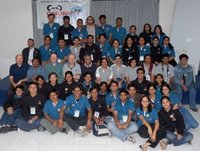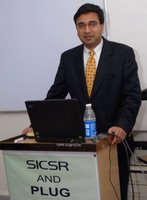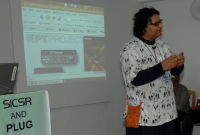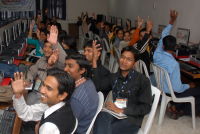While browsing through Google Labs‘ latest inventions, I was pleasantly surprised to find the Google India Labs site with this neat tool for Indic transliteration from English to 5 major Indian languages – Hindi, Kannada, Malayalam, Tamil and Telugu. The Hindi transliterator converts Roman characters to Devanagari characters. Of course it assumes that you can type “Hinglish” but the tool produces pretty accurate results. And it supports Google services such as Blogger and Orkut which are very popular in India. I’d love to see this tool integrated into GDocs for creating Hindi and other Indian language documents, presentations, spreadsheets. It would be a really useful tool for local language word processing and developing digital content. An API for transliteration of websites is available and its documentation can be found here. If you’re an open source Indic language whiz, check this tool out and provide feedback at google-india-labs@googlegroups.com
Tag Archives: India
Support ODF on Document Freedom Day
 Keep your data free. Free from vendor lock-in. Support Document Freedom Day on March 26. Activities and events will be held around the world to promote awareness of free document formats such as ODF.
Keep your data free. Free from vendor lock-in. Support Document Freedom Day on March 26. Activities and events will be held around the world to promote awareness of free document formats such as ODF.
It is great to see that India voted NO for OOXML yesterday. According to Venky Hariharan, 13 members voted “No”, 5 members voted “Yes” (including Microsoft India, Infosys, TCS, Wipro and NASSCOM), 1 member abstained and 3 members did not attend.
It appears that revenue partners and their special interests take precedence for India’s software export companies over preserving freedom of knowledge and rights of users to share data using open formats. Can money buy standards?
Take a stand and just say no! Support free document formats next week on March 26th. Organize awareness programs in your community, work with your favorite Linux Users Group and support Document Freedom Day.
GNUnify 2008 – It only gets better!
 GNUnify opened with a roar this year! More than a thousand smart developers and hackers, technology-hungry engineering students, foss enthusiasts, international open source gurus and successful entrepreneurs gathered for two days of great tech talks, install fests, hack fests, BOFs and lots of hallway and canteen conversations. The energy throughout the conference was amazing. Every year, I’ve seen this energy rise and add to the momentum of the conference.
GNUnify opened with a roar this year! More than a thousand smart developers and hackers, technology-hungry engineering students, foss enthusiasts, international open source gurus and successful entrepreneurs gathered for two days of great tech talks, install fests, hack fests, BOFs and lots of hallway and canteen conversations. The energy throughout the conference was amazing. Every year, I’ve seen this energy rise and add to the momentum of the conference.
 Harshad and his organizing team did a phenomenal job of covering an excellent range of topics in the conference program – from Mozilla Prism, Ruby on Rails, PHP, MySQL, Erlang, Django to visual design tips, network management and security. Every room was packed with spillover seating on the speaker dais. BOFs on IndLinux by Karunakar, LinuxChix India by Runa were well attended. The workshops and hands-on tutorials were packed beyond lab capacities with more than 80-90 attendees in each session. Topics such as mobile Linux, Ruby on Rails were immensely popular and the install fests for Fedora and Mandriva were just plain fun.
Harshad and his organizing team did a phenomenal job of covering an excellent range of topics in the conference program – from Mozilla Prism, Ruby on Rails, PHP, MySQL, Erlang, Django to visual design tips, network management and security. Every room was packed with spillover seating on the speaker dais. BOFs on IndLinux by Karunakar, LinuxChix India by Runa were well attended. The workshops and hands-on tutorials were packed beyond lab capacities with more than 80-90 attendees in each session. Topics such as mobile Linux, Ruby on Rails were immensely popular and the install fests for Fedora and Mandriva were just plain fun.
 There were a lot of talks I wanted to attend but could only manage to squeeze into Brian‘s talk on 10 things to know about open source, Niyam’s talk on visual design (really well done), Chander’s talk on building a open source company (great talk!) and David’s MySQL state of the union.
There were a lot of talks I wanted to attend but could only manage to squeeze into Brian‘s talk on 10 things to know about open source, Niyam’s talk on visual design (really well done), Chander’s talk on building a open source company (great talk!) and David’s MySQL state of the union.
 I ended up helping out for the Ruby on Rails workshop by Bob and it was sensational to see 80 keen hackers going through the process of building a Rails application and building an interface to MySQL. Talk about some serious energy, enthusiasm to learn and hack some cool code!
I ended up helping out for the Ruby on Rails workshop by Bob and it was sensational to see 80 keen hackers going through the process of building a Rails application and building an interface to MySQL. Talk about some serious energy, enthusiasm to learn and hack some cool code!
I particularly enjoyed meeting FOSS friends from all over India – from Chennai, Bangalore, Hyderabad, Mumbai, Delhi, Kolkata, Pune, Goa and many more places. My congratulations to Harshad, his super team of wonderful volunteers from SICSR’s student community and the tireless Pluggies (Sudhanwa and his team) who put in countless hours of effort and commitment to make GNUnify a rip-roaring success this year. Thanks to Vijay for his great photo coverage of Team GNUnify!
GNUnify just keeps getting better ![]() and better every time! Let’s keep it going like the Energizer Bunny!
and better every time! Let’s keep it going like the Energizer Bunny!
Uniting Open Minds at GNUnify
I’ve been part of GNUnify for a few years now – this will be my fifth year. It has been a marvelous experience to see the conference grow and gain wide national and international participation. GNUnify is organized by the professors and graduate students of the Symbiosis Institute of Computer Studies and Research (SICSR) in association with the Pune Linux Users Group (PLUG) to provide a platform for exchange of ideas and knowledge among industry professionals and academia. This year promises to be exciting – with international keynotes, in-depth technical sessions, hands-on workshops on the latest FOSS technologies, install fests and BOFs. Two days of intense discussions, hallway networking, learning about red-hot open source applications, BOF-ing with the gurus and of course enjoying SPDPs. For those who don’t know about the famous “SPDP” – come to GNUnify to find out more about it. Be there on February 8-9, 2008!
Pune’s PLUG Mash a resounding success
 Participating at PLUG’s mashup camp in October was an exciting opportunity for me to be among friends and Pluggies again.The PLUG Mash organized by the Pune Linux User’s Group and its friends and supporters was a resounding success. The 2-day camp had a combination of formal talks as well as a hack-a-thon for FOSS hackers to gather together and code. Major sponsors including Thoughtworks and Zmanda did an outstanding job of participating in the sessions. I found the talks by various open source contributors – Chris Stevenson (of Thoughtworks), Ramki (of Red Hat), Friji (of Radio Schizoid), Satish (of Red Hat), Valsa (of Intel), KK George (of Zmanda), Niyam (creative guru), and Karunakar (of Indlinux.org) – led to a valuable discussion of how developers, users and FOSS advocates are doing their part in making open source contributions possible from India. I presented about the Open Source Initiative (OSI) and its global initiatives and enjoyed the discussion thereafter about how OSI could become more pertinent in India’s ecosystem.
Participating at PLUG’s mashup camp in October was an exciting opportunity for me to be among friends and Pluggies again.The PLUG Mash organized by the Pune Linux User’s Group and its friends and supporters was a resounding success. The 2-day camp had a combination of formal talks as well as a hack-a-thon for FOSS hackers to gather together and code. Major sponsors including Thoughtworks and Zmanda did an outstanding job of participating in the sessions. I found the talks by various open source contributors – Chris Stevenson (of Thoughtworks), Ramki (of Red Hat), Friji (of Radio Schizoid), Satish (of Red Hat), Valsa (of Intel), KK George (of Zmanda), Niyam (creative guru), and Karunakar (of Indlinux.org) – led to a valuable discussion of how developers, users and FOSS advocates are doing their part in making open source contributions possible from India. I presented about the Open Source Initiative (OSI) and its global initiatives and enjoyed the discussion thereafter about how OSI could become more pertinent in India’s ecosystem.
Many thanks to my friends for putting in a lot of hard work, for being such fantastic hosts and making this 2-day camp in Pune memorable and successful for me. The great conversations, wonderful food, and the “coffee” added just the right touch. And reminded me of what makes Pune’s community so enjoyable to be part of.
Pharma patent loss is a win for healthcare and free software in India
In January 2006, India’s Patent Office rejected a patent application for Gleevec, a leukemia cancer drug by Swiss pharmaceutical Novartis. Now, in August 2007, the Chennai High Court has rejected Novartis’ appeal to overturn this rejection.
Novartis claims that India’s ruling will stunt R&D and innovation in pharmaceuticals and violates WTO intellectual property agreements. But the Indian government sees this decision as helping ensure that affordable medicines continue to be available for her people and those of other developing countries. Such medicines are essential to combat killer diseases like AIDS and cancer. Indian companies manufacture generic Gleevec (known as Glivec in India) for one-tenth the price offered by Novartis.
Why does this matter?
India’s ruling will deter international pharma giants from trying to extend their monopolies by patenting newer versions of existing medicines. This ruling allows India to continue manufacturing inexpensive generic drugs. For example, 85% of AIDS generics to Africa are provided by India’s pharmaceuticals. That’s significant.
This precedent also establishes a model for rejecting software patents in India. The arguments that favor availability of generic medicines equally apply to free and open source software (FOSS). India cannot afford the monopolies and high prices brought about by software patents. FOSS is the only practical way developing nations can afford long-term, large-scale IT automation. Without automation, India and others cannot scale to provide the infrastructure and banking, education and health care needed to ensure prosperity for billions of people across the globe.
Open Invention Network (OIN) visits India
Jerry Rosenthal, CEO of intellectual patents company – Open Invention Network (OIN), was in India last week to interact with technology companies in Delhi, Bangalore and Hyderabad. During its trip, OIN met with leaders in government, the IT industry and with India IP experts to discuss ways Linux can promote innovation as well as how to better protect Linux end-users and developers. Two Indian companies were announced as new licensees of OIN – ClickforHelpIndia.com and Quad One Technologies. ClickforHelpIndia.com is a partnership between ClickforHelp.com of Vienna, Virginia and Sumangala CreativeTech India Pvt. Ltd. (SCTI) of Hyderabad. It offers call center helpdesk services. Quad One Technologies Pvt. Ltd. of Hyderabad provides offshore software consulting services for the healthcare/pharmaceutical industry.
Indian law does not recognize software patents as of now, though it is under tremendous pressure from the WTO to buckle under. Today, Indian IT companies involved in offshoring and outsourcing for US clients are the prime candidates for joining OIN’s license network.
OIN was formed in 2005 by IBM, NEC, Novell, Philips, Red Hat, and Sony. It has more than 100 worldwide patents and patent applications as part of its patent commons. These patents can be licensed royalty-free by companies to provide IP protection to Linux end-users, distributors and developers. OIN, a for-profit company, is one of the many organizations such as the Linux Foundation and SFLC who have set up groups to defend Linux against possible patent attacks. One of OIN’s goals is to evaluate software and hardware Linux-based solutions and potentially acquire, for its patent commons, the IP embodied in the best solutions.
BIS revisits Indian IT standards
The Bureau of Indian Standards (BIS) held their second seminar on IT standards in Bangalore on April 12 where they seem to have acquired a semblance of political rectitude by including participants and speakers from a wider swath of the industry. In contrast to the first seminar held earlier this year in New Delhi (February 21), they allowed competing industry stakeholders to represent their positions on IT standards. Proponents of the Open Document Format (ODF) such as IBM, Sun, and Red Hat emphasized the need for open, global standards. Microsoft with its Office Open XML (OOXML) standard reiterated Craig Mundie’s message from his talk in Delhi that standards should support interoperability and innovation should be forged through strong IPR.
BIS’s additional director general Rakesh Verma announced the formation of a panel of 30 organizations to work along with BIS to help build IT standards for India. Action items for this panel include identifying relevant international standards documents and creating India-specific standards as needed. One hopes that BIS will keep the process transparent to ensure open dialog and comments by the public and experts at large.
Today the digital world has multiple vendors and multiple standards. From a nation’s point of view, choosing only one standard from among multiple non-universal standards may be premature. However, enforcing interoperability via adopting open formats and promoting a level playing field can ensure that competing standards play together and communicate productively. An open standards development process can only enhance the prospects of interoperability. The government’s interest lies in having all stakeholders compete fairly to protect and support the consumer’s interests.
Mystifying Open Source and Open Standards
This article by the national technology officer of MS India represents the kind of misinformation about open source and open standards being disseminated in India. This type of FUD confuses the government as well as the market. It points to the need for all stakeholders in India’s open source industry and community to rise up to this challenge.
Tax hike proposal threatens VC interest in Indian IT
India’s finance minister P. Chidambaram has proposed a 35 percent tax on stock options issued by Indian companies. Software and hardware information technology, telecommunications and biotechnology – all high growth industry segments – would be affected.
If Chidambaram’s proposal becomes law, Indian companies will have to pay the tax on all stock options (ESOPs) issued to employees. This could dampen VC investment into India and discourage entrepreneurial activity in software as well as in biotechnology.
However, surprisingly, most Silicon Valley investment firms are optimistic that these short term tax changes won’t make India less attractive for long-term investment. They predict that money will continue to roll into India’s markets.